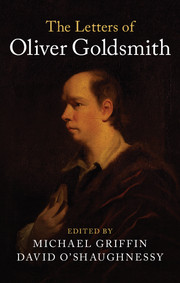32 - To Sir Joshua Reynolds, [Lille, 27 July 1770]
Summary
Joshua Reynolds (1723–92) was an artist and art theorist who was the founding president of the Royal Academy. He also established the Club and this is where his intimacy with Goldsmith developed, the pair having first met in 1761 through their mutual friend Johnson. Reynolds, also a bachelor, was a great champion of Goldsmith throughout his career, encouraging him to practise medicine again in 1765, advocating on behalf of The Good Natur’d Man, and even making Goldsmith Professor of Ancient History at the Royal Academy, much to his friend's delight, as we can see in Letter 29 above. This faith in Goldsmith's abilities was warmly acknowledged in The Deserted Village's dedication to Reynolds, which imagined him as a surrogate brother. Reynolds also featured in Retaliation, one of Goldsmith's final poems.
This letter and the one following describe a trip to Paris taken by Goldsmith and the Horneck sisters and their mother, probably at the behest of Reynolds. They travelled to the French capital via Lille before returning to England. The trip, according to Prior, lasted six weeks in total and, despite the reasonably energetic tone of the first letter, appears to have been a failure. Money, as often, seems to have been at the heart of the difficulty. At a dinner with John Ridge, an Irish lawyer (the ‘anchovy’ of Retaliation), Goldsmith was asked for his views on such trips. He replied, more than a little bitterly, ‘I recommend it by all means to the rich if they are without the sense of smelling, and to the poor if they are without the sense of feeling’ (P, II: 297). As the following letter reveals, this letter was never sent.
The copy-text is Balderston’s; her transcription was taken from the original in the possession of Constance Meade (Percy's great-granddaughter) which was inserted in her album and not deposited at the British Library with the rest of her Goldsmith letters. Its current location is unknown. It was first published by Percy in 1801. It has no address. The letter was given by Reynolds to Boswell and then on to Thomas Percy, confirmed by a marginal note ‘Original letter of Dr. Goldsmith to Sir Joshua Reynolds, who gave it to me. James Boswell’.
- Type
- Chapter
- Information
- The Letters of Oliver Goldsmith , pp. 87 - 88Publisher: Cambridge University PressPrint publication year: 2018



